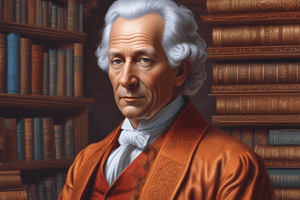Podcast
Questions and Answers
What does phenomenology mainly focus on studying?
What does phenomenology mainly focus on studying?
- The external world and its existence
- The physical characteristics of objects
- The universal features of consciousness (correct)
- The language of biblical texts
What does the German term 'Dasein' translate to in English?
What does the German term 'Dasein' translate to in English?
- Being now
- Being everywhere
- Being there (correct)
- Being here
In the context of human existence, what best describes the concept of 'being-in-the-world'?
In the context of human existence, what best describes the concept of 'being-in-the-world'?
- Isolation from surroundings
- A detachment from experiences
- Existence without interaction
- Existence influenced by context (correct)
What aspect of Dasein is reflected when discussing 'care' or 'Sorge'?
What aspect of Dasein is reflected when discussing 'care' or 'Sorge'?
Which philosophical aspect is Martin Heidegger best known for?
Which philosophical aspect is Martin Heidegger best known for?
What does 'facticity' refer to in the context of human existence?
What does 'facticity' refer to in the context of human existence?
How does temporal existence influence a human person according to the discussed concepts?
How does temporal existence influence a human person according to the discussed concepts?
What type of understanding does hermeneutics primarily emphasize?
What type of understanding does hermeneutics primarily emphasize?
Flashcards
Phenomenology
Phenomenology
The philosophical study of reality as subjectively experienced, focusing on conscious experience without assuming anything about the external world.
Hermeneutics
Hermeneutics
The theory and method of interpretation, particularly of texts like biblical texts or philosophical works.
Martin Heidegger
Martin Heidegger
Important 20th-century philosopher known for his contributions to phenomenology, hermeneutics, and existentialism
Dasein
Dasein
Signup and view all the flashcards
Being-in-the-world
Being-in-the-world
Signup and view all the flashcards
Care/Sorge
Care/Sorge
Signup and view all the flashcards
Temporality
Temporality
Signup and view all the flashcards
Facticity (Past)
Facticity (Past)
Signup and view all the flashcards
Study Notes
Phenomenology
- Phenomenology is the philosophical study of subjectivity and reality as experienced.
- It investigates universal consciousness features without assuming external world truths.
- Aims to describe phenomena as they appear to the subject.
- Explores the meaning and significance of lived experiences.
Hermeneutics
- Hermeneutics is the theory and method of interpretation especially of biblical texts, wisdom literature, and philosophical texts.
- It may involve understanding and communication skills, as needed.
Phenomenology Types
- Hermeneutical Phenomenology: Reflects on lived experiences, interpreted by the researcher.
- Transcendental Phenomenology: Focuses less on researcher interpretation, more on describing participant experiences.
Husserl vs. Heidegger
-
Husserl's Transcendental Approach:
- Direct approach, detached observer.
- Aims to get inside subjects' heads (understand subjective experiences accurately).
- Focuses on encouraging subjects to reflect for deeper understanding.
- Seeks both subjective and objective understanding.
- Uses rational thinking.
-
Heidegger's Hermeneutic Approach:
- Indirect approach, connected and involved observer.
- Focuses on shared experiences.
- Captures unreflective activity through field notes.
- Uses language as a tool.
- Uses intuitive thinking.
Martin Heidegger
- German philosopher known for contributions to phenomenology, hermeneutics, and existentialism.
- Highly influential 20th-century philosopher.
Dasein
- Definition: A German term meaning "being there," viewed in the context of human existence within the world.
Characteristics of Dasein
- Human beings exist within a world; they are not isolated.
- Human beings have self-definitions, derived from their existence within the world.
Involvement or Engagement of Dasein
- Being Alongside (Care): Involvement characterized by utility. Objects and events are seen as tools for use.
- Being With (Care): Involvement characterized by empathy and forbearance. Showing consideration to other people.
Temporality
- Human existence is bound by time.
- Human beings have a past, present, and future.
Human Time and Temporality
- Past (Facticity): Unchangeable aspects of human existence.
- Present (Fallenness): State of inauthentic existence, where individuals don't make their own choices.
- Future (Existentiality): Possibilities available to individuals to define themselves moving forward.
Studying That Suits You
Use AI to generate personalized quizzes and flashcards to suit your learning preferences.



